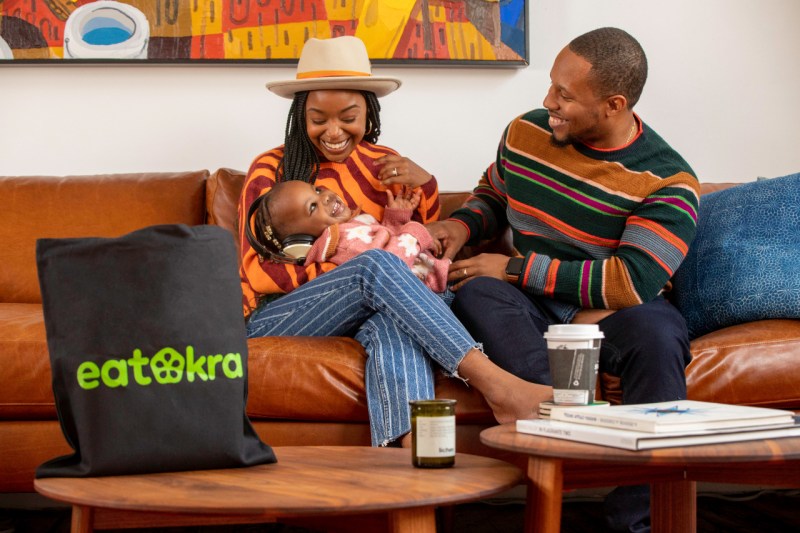For husband and wife team Anthony and Janique Edwards, their creation of the EatOkra app was a combination of both passion and timing. A Harlem native, Janique moved to Brooklyn in 2016. Excited and intent on exploring the borough, both Janique and Anthony were eager to seek out and support Black-owned businesses in the area. However, they quickly realized that finding those Black-owned businesses proved harder than expected.
“We were really seeking out Black-owned businesses to support during that time. And Anthony was also was really trying to level up his skills as a developer, wanting to build an app but just really not sure what he wanted to build,” said Janique. “And because we were having this issue of finding businesses — it wasn’t something that was super convenient, I kind of made this suggestion out of frustration that he build an app that would make it super simple to find these businesses.”

After a series of trials and errors, Janique and Anthony grew this seed of inspiration into EatOkra, an app that highlights Black-owned restaurants. While the app uses modern technology, EatOkra is also a social justice mission, keen on the idea that promoting Black-owned businesses is critical for the community. Since launching in 2016, EatOkra has grown exponentially and now proudly features more than 11,000 black-owned eateries, providing a platform for users to discover some truly delicious and unique local restaurants.
How The EatOkra App Works

So how does EatOkra work? To start, the majority of the information for restaurants and businesses on EatOkra is crowd-sourced, meaning the app relies heavily on user recommendations. For instance, if a user comes across a restaurant they think is a good fit but not already in the database, they can recommend it on the app. After this recommendation is received, a team at EatOkra then vets the restaurant and fills out any information that wasn’t included by the user. As part of the user experience, people can also leave reviews and ratings for the various eateries. Finally, another helpful feature of the app is its ability to bookmark restaurants for future visits. This is especially helpful for people traveling to different cities. By bookmarking places in advance, EatOkra makes it easy to find and try restaurants in a completely new locale.
As an app, EatOkra has an elegant design, with a defined focus on usability. The app is designed to be geolocation aware and will pull up all viable restaurants in its database within a 20-mile radius. From there, users can then also filter, search, or query for specific restaurants or cuisines, which can range from Southern American barbecue to Haitian cuisine. This streamlined and user-friendly setup has been a big hit for EatOkra. In 2021, that success was awarded when EatOkra was one of only five apps to receive the Apple “Trend of the Year” Award for successfully connecting people in a meaningful way.
EatOkra’s Plans for the Future
For Janique, promoting Black-owned businesses is not only a macro issue — it’s also an issue she has experienced in her own family. Previously, Janique’s older sister had owned a nail boutique in Harlem, quickly growing the business into a valued part of the community. Unfortunately, despite its beloved status, the business was short-lived. After only three years, the nail boutique shut down, a closure that deeply affected Janique.
“I got a firsthand opportunity to really see someone who was really ambitious, who had this dream, and wanted to do great work in her community, unfortunately, fail at it because of lack of resources, lack of education and lack of mentorship,” said Janique.

After seeing this effect on her own family, Janique wanted to be a part of a solution that sought to alleviate these obstacles. Because of a historic lack of resources for the Black community, this tale of a local establishment closing down is unfortunately all too common. Often, many Black business owners and restaurateurs are disadvantaged when it comes to sustaining their ventures because of a lack of mentors and resources. To tackle this systemic problem, Janique and Anthony are launching an ambitious project within EatOkra — an e-learning platform. Essentially, this will be a series of educational classes designed to give small Black-owned businesses the tools they need to succeed. To start off, the first class on the e-learning platform will be on CEO mindset, focused on the psychological and leadership perspectives needed to run a successful business. But this initial foray is just the beginning — subsequent classes will feature topics on everything from marketing to menu development. Together, Janique and Anthony plan on launching the first phase of this e-learning platform in 2022.
Its precisely this unique and dynamic mix of technology, community, and respect for heritage that makes EatOkra a standout technology app. Empowerment and ownership are both carefully balanced and championed by EatOkra, an understanding that’s even relevant by a close examination of the app’s chosen name — okra. This humble vegetable with African origins is an essential ingredient in the American South, with deep roots in African American history.
“Okra was a seed that was brought over by the slave trade. Okra is a really popular ingredient in Southern cooking, dishes like gumbo and stews. EatOkra is really a nod to our heritage. It’s really a nod to our family, history, and culture,” said Anthony.



